3 Ways You Could Be Holding Your Baby Back at Mealtimes
In this episode we're talking about:
- How purees are an important texture for babies to master, they're just not the only texture for foods babies can - or should - babies can eat
- Why filing to offer allergenic foods can actually increase risk of choking
- Why soft sticks of food that squeeze easily between your forefinger and your thumb
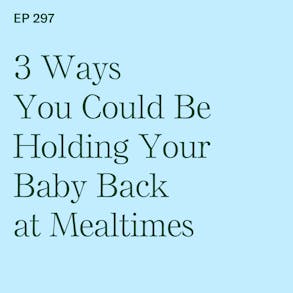
LISTEN TO THIS EPISODE
Episode Description
Nobody holds their baby’s development back on purpose…but there are feeding practices that can inadvertently be delaying your baby’s progression towards important milestones. In this episode I’m sharing 3 ways you could be holding your baby back at mealtimes - and then brainstorming on simple tweaks to help get your baby back on track with independent self-feeding.
Links from this Episode
- Baby-Led Weaning with Katie Ferraro program with the 100 First Foods™ Daily Meal Plan, join here: https://babyledweaning.co/program
- Baby-Led Weaning for Beginners free online workshop with 100 First Foods™ list to all attendees, register here: https://babyledweaning.co/baby-led-weaning-for-beginners
Other episodes related to this topic:
- Episode 227 - When Does the Food Allergy Prevention Window Close? with @allergykidsdoc David Stukus, MD https://blwpodcast.com/episodes/227

Latest Episodes
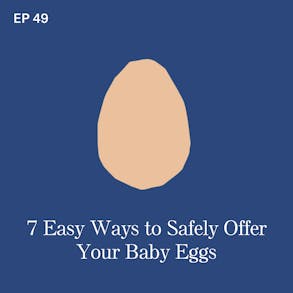

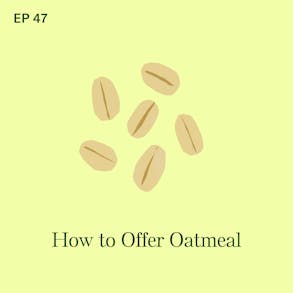

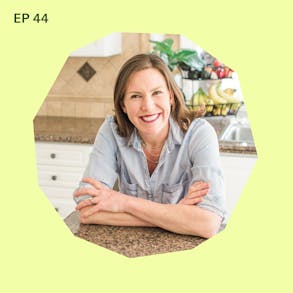
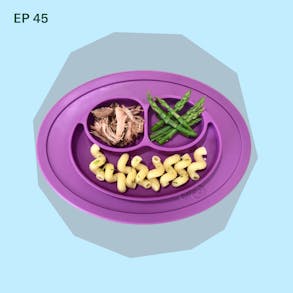
Katie Ferraro (35s):
And so, because the baby had already had an allergic reaction to three of the big nine Allergenic foods, the mom was inherently scared to try the other six allergenic foods. But just because your baby has had an or has a food Allergy to one food does not necessarily mean they're going to be allergic to all of the other foods. And in fact, the only thing you can do to reduce your baby's risk of food Allergy down the road is to actually feed those allergenic foods early and often, even if it sounds or feels a little bit scary. Hey there, I'm Katie Ferraro, registered dietician, college nutrition professor and mom of seven specializing in baby-led weaning here on the baby-led weaning Made Easy podcast I help you strip out all of the noise and nonsense about feeding, leaving you with the confidence and knowledge you need to give your baby a safe start to solid foods using baby-led weaning.
Katie Ferraro (1m 28s):
Well, hello there. welcome back. Today I'm gonna be sharing three ways that you might inadvertently be holding your baby back at Mealtimes. I don't know about you guys, but I love real life stories. They help me learn so much more than like theoretical situation. So I'm gonna share three real life stories of families that were struggling with regards to Infant feeding, and then share the simple tweaks that they made to help get their baby back on track with making a safe transition to solid foods. Here are three ways you could potentially be holding your baby back at Mealtimes. The first way is staying stuck on purees for two long. There was a mom on my live weekly office hours this week who asked a question, and I'm gonna paraphrase her question, but basically the mom's mom.
Katie Ferraro (2m 10s):
So grandma watches the baby during the day and I've tried explaining baby-led weaning her and she's still hesitant to give him finger foods. And this is an eight and a half month old baby, you guys. So this is like they're in phase two of baby-led weaning. They're 10 weeks into this. But when the baby goes to grandma, he still gets yogurt, oatmeal, jarred purees, and is only allowed to self feed those. And mom was like, I'm thinking about making some lumpy purees to send along too, like a stew with finely shredded meat and minced veggies or a bean soup with a bean smash. Really? Well, would these be a safe option? How thick or thin should I make the soup in Any advice on this? So my response to this mom is, whoa, your baby's eight and a half months of age. You're almost at the nine month mark, which means you're almost halfway through baby-led weaning, right? If we start baby-led weaning at six months when your baby's getting a hundred percent of their nutrition from Infant milk, that's breast milk or formula.
Katie Ferraro (2m 54s):
And in the next six months, we're moving towards when your baby turns one. We want most of baby's nutrition to be coming from food and not Infant milk. It kind of goes without saying that somewhere around the nine month mark, you're hitting the halfway point where about half of baby's nutrition should be coming from food and half from Infant milk. And so for an eight and a half month old baby, we do not wanna be encouraging more purees. Okay? If anything, we wanna be doing the opposite, moving away from purees. And so my suggestion to this mom, because she's going through my hundred first foods program, is, mom, let's look at all of the foods that your baby has already eaten. Let's find the ones that you are the most comfortable with making And that you know your baby is the most comfortable with eating. And let's send those soft, solid pieces to food, to grandma's house and no more purees.
Katie Ferraro (3m 35s):
Now, grandma might not be super comfortable with it at first, but if you sit down and you show grandma, look, this is how the baby picks up the strips of meat and brings it to their mouth. Or these are the porridge sticks that I've already kind of rolled out and laid out, and you just put 'em in the bowl and the baby picks it up, look how he brings it to his mouth. Seeing really is believing. And there's this notion that offering purees is quote unquote safer. But I always like to remind parents that research shows us that it's the babies who've had the least amount of practice with finger foods that are actually at elevated risk of choking. And so for an eight and a half month old baby, there's absolutely no reason to be puréeing foods that grandma is then feeding that baby from a developmental standpoint. Certainly should be picking up the foods and bringing it to their mouth. We talked a little bit about probably needing to drop a milk feed at this phase in order to allow the baby to start feeling a little bit of casual hunger.
Katie Ferraro (4m 22s):
But then a lot of the interpersonal stuff, I know it can be hard with like grandparents or caregivers, but at the end of the day, you're, this family is moving through a hundred different foods and they've been doing baby-led weaning for 10 weeks. That baby has 50 different foods, and there's some of those solid foods that mom is comfortable with. She's got to get comfortable with having grandma offer those foods as well, because we don't want that baby to get stuck on purees. Hey, we're gonna take a quick break, but I'll be right back.
Katie Ferraro (6m 8s):
The second way in which you could be potentially holding your baby back at Mealtimes is failing to introduce the allergenic foods. Now. I was working with a friend locally where I live in San Diego and her baby had had a very severe eczema. I've shared a lot about this baby on the podcast recently and and last year because she was a a, a big, big, big Allergy baby, right? She had severe eczema, the baby had an allergic reaction to cow's milk, protein to egg, and to peanut, okay? And the mom was like, then they moved outta state. So I'm like texting her and just checking in. How are you guys doing? And she's like, I'm so scared to introduce all of the other allergenic foods because my baby already had allergic reactions to some foods. But we talked about, listen, those are the foods that your baby already reacted to, but just because your baby has had allergic reactions to one or more foods does not necessarily mean that there are going to be allergic to all foods.
Katie Ferraro (6m 55s):
And so for this particular baby, there are nine potentially allergenic foods, the big nine, right? Those are the ones that account for about 90% of food Allergy in the United States. And we did milk and egg and peanut, okay? But for a number of different reasons, we knew that this baby was at high risk for egg and peanut Allergy. And the baby had already had a diagnosed cow's milk protein Allergy. But the other six allergenic foods, there was absolutely nothing to indicate that this baby was at elevated risk other than she had had some existing food allergies. So what I'm trying to say is, just because you have a food Allergy doesn't automatically put you in the high risk category. It slightly elevates the risk of having a food Allergy, two different foods But. it doesn't mean you're necessarily going to, and the mom thought, well, my baby's allergic to three of the foods, so she's gonna be allergic to the other six of the big nine.
Katie Ferraro (7m 38s):
And that's definitely not the case. And in fact, when we talked it through, listen, the only thing you can do, mom, dad, caregiver, to reduce your baby's risk of food Allergy to the other foods down the road, is actually to introduce those allergenic foods early and often. That's when it kind of clicked for her. Like, whoa, I kind of have to do this. Okay? And it's important to point out too, that the protective window for early introduction of allergenic foods, in order for that to prevent food Allergy, we think it closes at around 11 months of age. I had Dr. David Stukus, who's the country's leading pediatric allergist in the United States. He came on back in episode 227, and we talked about When, Does, the Food, Allergy, Prevention, Window, Close. If you have babies kind of coming up on that 11 month mark and you haven't done the big nine allergenic foods, there's some really good tips in there about the research that shows why you wanna do it.
Katie Ferraro (8m 22s):
And then some tips on how to safely prepare those foods. But. it basically worked it out for her with the last six foods to be like, all right, here's the schedule that you should introduce them. Here's how you can do it safely. And prior to that baby turning one, she got a little bit past the 11 month mark. But anyway, we did it before the baby turned one. The baby did have the rest of the big allergenic foods, absolutely no allergic reaction to those. And that's a peace of mind for the mom. Like, oh my gosh, Now I can safely feed these other six allergenic foods, even though I know my baby has diagnosed food Allergy to three. It doesn't mean you're going to be allergic to all of the allergenic foods. So make sure you get those allergenic foods in early and often in order to help reduce your baby's risk of food Allergy down the road. All right, the third and final way that you could be potentially holding your baby back at Mealtimes is not progressing past the simple starter foods So.
Katie Ferraro (9m 4s):
it was at lunch with a family member recently who has an 11 month old baby and this baby, and the mom said it. She's like, I'm not doing a good job of introducing the new foods. I'm like, you are doing as good of a job as you possibly can. You both work full-time, the baby goes to daycare. But the point was, the baby only has about 10 foods and is almost turning one. And so we talked about it like what is the biggest barrier to you guys not progressing past these simple starter foods? And for the mom, I said, are you said that you're scared of choking? She's like, no, I'm actually over the fear of choking. Early on I was scared of choking, but Now I, see how much he loves eating and picking the food up and bringing it to his mouth. And we have his feet resting on flat on a footrest, like I'm doing all the things to reduce choking risk. And on top of that, I've taken an online refresher Infant CPR course, so I know what to do if he chokes.
Katie Ferraro (9m 46s):
Plus she's a nurse, so she knows what to do if he chokes. But the end of the day, the choking thing is no longer a berry for her. But the reason why she's not progressing past the simple starter foods is she says, I don't do meal prep. I know I should meal prep on the weekends for both her, the adults in her family, but also for the baby. And so we talked about that, like it's hard, right? You're working all week and then you have a limited amount of time with your baby on the weekend, and maybe cooking is not your favorite thing to do. But in order to kind of help get her back on track, it took out the hundred first foods list, kind of knocked off the foods that the baby had eaten, but talked about all of the other foods that were on the list that her baby safely could be eating. But also acknowledging that those foods aren't magically going to appear on the baby's table. And, that if we look at your traditionally spoon-fed baby, right?
Katie Ferraro (10m 26s):
They only have 10 or 15 foods by the time they turn one. And if you lose those 10 or 15 foods in year two of life to picky eating, cuz we know that most one-year-olds will start developing some degree of food neophobia or picky eating. You lose those 10 or 15 foods that becomes such a challenging child to feed. But if your baby has a hundred foods under their belt and then you lose 10 or 15 foods, it's really not that big of a deal because you still have like 85 or 90 foods that the baby will eat. Hey, we're gonna take a quick break, but I'll be right back So what we did was kind of reset and go back to basics and the back to basics for baby-led weaning is picking out five foods each week that your baby is going to try.
Katie Ferraro (11m 55s):
The five new foods when we use my five step feeding FRAMEWORK. So from the hundred first foods list, we pick a new fruit for Monday, a new vegetable for Tuesday, a new starchy food for Wednesday, a new protein food for Thursday, and a new allergenic food for Friday. We happen to be on vacation, so the family's gonna be traveling. I said, Hey, let's pick out the foods for the following week. So the foods that we picked out, do you have these at home? Can you get these? If not, is there like there was kind of a wacky hole grain that amaranth was the one we were gonna do that she needed to order online So. It was like, okay, if you don't have the foods in your house, you're not going to make them. So picking out the five foods that you're going to feed your baby in the coming week or the week after next, ordering the foods, making sure you have them on hand. You can really condense the amount of time that it then takes you to get those new foods together so that you can actually offer them to your baby.
Katie Ferraro (12m 40s):
But again, you've got to feed this baby for the next 17 and a half years of its life. My argument is always that it's totally worth it to put in the hard work now where you can get the baby to eat a hundred or more foods that they willingly like and accept so that as you move into toddlerhood and preschool age and school age, that the child will have so many more foods under their belt. And to be honest, you as a parent will have so many more options to choose from as well. So in summary, three things to steer clear of. Don't get stuck on purees for too long, recognizing that purees are an important texture for babies to eat, just not the only one that they can eat. Number two, don't fail to introduce the allergenic foods, you've got to get those big nine allergenic foods in prior to 11 months of age. In my hundred first foods list, there's a potentially allergenic foods category that actually has 20 different variations of those nine foods and lots of ideas on how you can safely feed them.
Katie Ferraro (13m 28s):
And number three is don't fail to progress beyond the simple starter foods. Your baby can and wants to eat so many more foods than you may be giving them credit for. But at the end of the day, those foods don't magically appear on the table, and it is on us to make safe variations of a variety of foods that our baby can safely eat. You can get all of the links from this episode on the show notes page, which you can find at BLW podcast.com/ 2 97. And a special thanks to our partners at AirWave Media. If you guys like podcasts that feature food and science and using your brain, check out AirWave Media. We're online at blwpodcasts.com in the show notes BLW podcast.com/297. Thanks so much for listening, and I'll see you next time.
Katie Ferraro (14m 10s):
Bye now.

The Program Baby-Led Weaning with Katie Ferraro
A step-by-step digital program for starting solid foods safely and navigating the original 100 FIRST FOODS™ meal plan with baby-led weaning.
 EXPERT-LED, PROVEN APPROACH TO EATING REAL FOOD
EXPERT-LED, PROVEN APPROACH TO EATING REAL FOOD CONCISE VIDEO TRAININGS TO MASTER BABY-LED WEANING
CONCISE VIDEO TRAININGS TO MASTER BABY-LED WEANING 100 FIRST FOODS DAILY MEAL PLAN WITH FOOD PREP VIDEOS
100 FIRST FOODS DAILY MEAL PLAN WITH FOOD PREP VIDEOS
Baby-Led Weaning for Beginners Free Workshop
Is your baby ready to start solid foods, but you’re not sure where to start? Get ready to give your baby a solid foundation to a lifetime of loving real food…even if you’re feeling overwhelmed or confused about this next stage of infant feeding.
Get baby-led weaning recipes and tips delivered to your email inbox.

